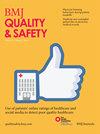S. McCarthy, R. Laaksonen, V. Silvari
{"title":"从成人重症监护环境过渡到护理——实施干预措施以提高药物安全性和患者预后","authors":"S. McCarthy, R. Laaksonen, V. Silvari","doi":"10.1136/bmjqs-2021-014443","DOIUrl":null,"url":null,"abstract":"© Author(s) (or their employer(s)) 2022. No commercial reuse. See rights and permissions. Published by BMJ. On admission to an intensive care unit (ICU), patients’ regular longterm medications may be withheld while they are being stabilised. Such medications are sometimes not restarted during the rest of their hospital stay, even when transferred to a lower acuity ward or discharged from hospital. This puts patients discharged from an ICU at higher risk of unintentional medication discontinuation, which could lead to future exacerbation of chronic conditions. Additionally, ICU patients may have medications commenced in the acute stage of their ICU admission (eg, gastric acid secretion inhibitors) that might inadvertently be continued following transfer from the ICU. There is a growing body of evidence that care transitions, whether from inpatient to outpatient settings, or within a hospital stay between different specialties or departments, pose an elevated risk of patients experiencing negative outcomes such as medication errors or adverse events. 4 A systematic review suggests that across five studies, the median rate of medication errors following hospital discharge is 53% per adult discharged patient. However, less is known about medication errors in adults transferred from ICU to general hospital wards; the limited research available suggests high levels of medication errors associated with this transition point with 46%–74% of patients experiencing a medication error. 7 Commonly occurring errors include continuation of medication indicated only in the ICU, untreated indications and medications without an indication. There is a need to understand what interventions can be used to reduce medication errors, and the effectiveness of these interventions, when transitioning patients from the ICU setting.","PeriodicalId":49653,"journal":{"name":"Quality & Safety in Health Care","volume":"31 1","pages":"565 - 568"},"PeriodicalIF":0.0000,"publicationDate":"2022-05-04","publicationTypes":"Journal Article","fieldsOfStudy":null,"isOpenAccess":false,"openAccessPdf":"","citationCount":"2","resultStr":"{\"title\":\"Transition of care from adult intensive care settings – implementing interventions to improve medication safety and patient outcomes\",\"authors\":\"S. McCarthy, R. Laaksonen, V. Silvari\",\"doi\":\"10.1136/bmjqs-2021-014443\",\"DOIUrl\":null,\"url\":null,\"abstract\":\"© Author(s) (or their employer(s)) 2022. No commercial reuse. See rights and permissions. Published by BMJ. On admission to an intensive care unit (ICU), patients’ regular longterm medications may be withheld while they are being stabilised. Such medications are sometimes not restarted during the rest of their hospital stay, even when transferred to a lower acuity ward or discharged from hospital. This puts patients discharged from an ICU at higher risk of unintentional medication discontinuation, which could lead to future exacerbation of chronic conditions. Additionally, ICU patients may have medications commenced in the acute stage of their ICU admission (eg, gastric acid secretion inhibitors) that might inadvertently be continued following transfer from the ICU. There is a growing body of evidence that care transitions, whether from inpatient to outpatient settings, or within a hospital stay between different specialties or departments, pose an elevated risk of patients experiencing negative outcomes such as medication errors or adverse events. 4 A systematic review suggests that across five studies, the median rate of medication errors following hospital discharge is 53% per adult discharged patient. However, less is known about medication errors in adults transferred from ICU to general hospital wards; the limited research available suggests high levels of medication errors associated with this transition point with 46%–74% of patients experiencing a medication error. 7 Commonly occurring errors include continuation of medication indicated only in the ICU, untreated indications and medications without an indication. There is a need to understand what interventions can be used to reduce medication errors, and the effectiveness of these interventions, when transitioning patients from the ICU setting.\",\"PeriodicalId\":49653,\"journal\":{\"name\":\"Quality & Safety in Health Care\",\"volume\":\"31 1\",\"pages\":\"565 - 568\"},\"PeriodicalIF\":0.0000,\"publicationDate\":\"2022-05-04\",\"publicationTypes\":\"Journal Article\",\"fieldsOfStudy\":null,\"isOpenAccess\":false,\"openAccessPdf\":\"\",\"citationCount\":\"2\",\"resultStr\":null,\"platform\":\"Semanticscholar\",\"paperid\":null,\"PeriodicalName\":\"Quality & Safety in Health Care\",\"FirstCategoryId\":\"1085\",\"ListUrlMain\":\"https://doi.org/10.1136/bmjqs-2021-014443\",\"RegionNum\":0,\"RegionCategory\":null,\"ArticlePicture\":[],\"TitleCN\":null,\"AbstractTextCN\":null,\"PMCID\":null,\"EPubDate\":\"\",\"PubModel\":\"\",\"JCR\":\"\",\"JCRName\":\"\",\"Score\":null,\"Total\":0}","platform":"Semanticscholar","paperid":null,"PeriodicalName":"Quality & Safety in Health Care","FirstCategoryId":"1085","ListUrlMain":"https://doi.org/10.1136/bmjqs-2021-014443","RegionNum":0,"RegionCategory":null,"ArticlePicture":[],"TitleCN":null,"AbstractTextCN":null,"PMCID":null,"EPubDate":"","PubModel":"","JCR":"","JCRName":"","Score":null,"Total":0}
引用次数: 2
Transition of care from adult intensive care settings – implementing interventions to improve medication safety and patient outcomes
© Author(s) (or their employer(s)) 2022. No commercial reuse. See rights and permissions. Published by BMJ. On admission to an intensive care unit (ICU), patients’ regular longterm medications may be withheld while they are being stabilised. Such medications are sometimes not restarted during the rest of their hospital stay, even when transferred to a lower acuity ward or discharged from hospital. This puts patients discharged from an ICU at higher risk of unintentional medication discontinuation, which could lead to future exacerbation of chronic conditions. Additionally, ICU patients may have medications commenced in the acute stage of their ICU admission (eg, gastric acid secretion inhibitors) that might inadvertently be continued following transfer from the ICU. There is a growing body of evidence that care transitions, whether from inpatient to outpatient settings, or within a hospital stay between different specialties or departments, pose an elevated risk of patients experiencing negative outcomes such as medication errors or adverse events. 4 A systematic review suggests that across five studies, the median rate of medication errors following hospital discharge is 53% per adult discharged patient. However, less is known about medication errors in adults transferred from ICU to general hospital wards; the limited research available suggests high levels of medication errors associated with this transition point with 46%–74% of patients experiencing a medication error. 7 Commonly occurring errors include continuation of medication indicated only in the ICU, untreated indications and medications without an indication. There is a need to understand what interventions can be used to reduce medication errors, and the effectiveness of these interventions, when transitioning patients from the ICU setting.

 求助内容:
求助内容: 应助结果提醒方式:
应助结果提醒方式:


